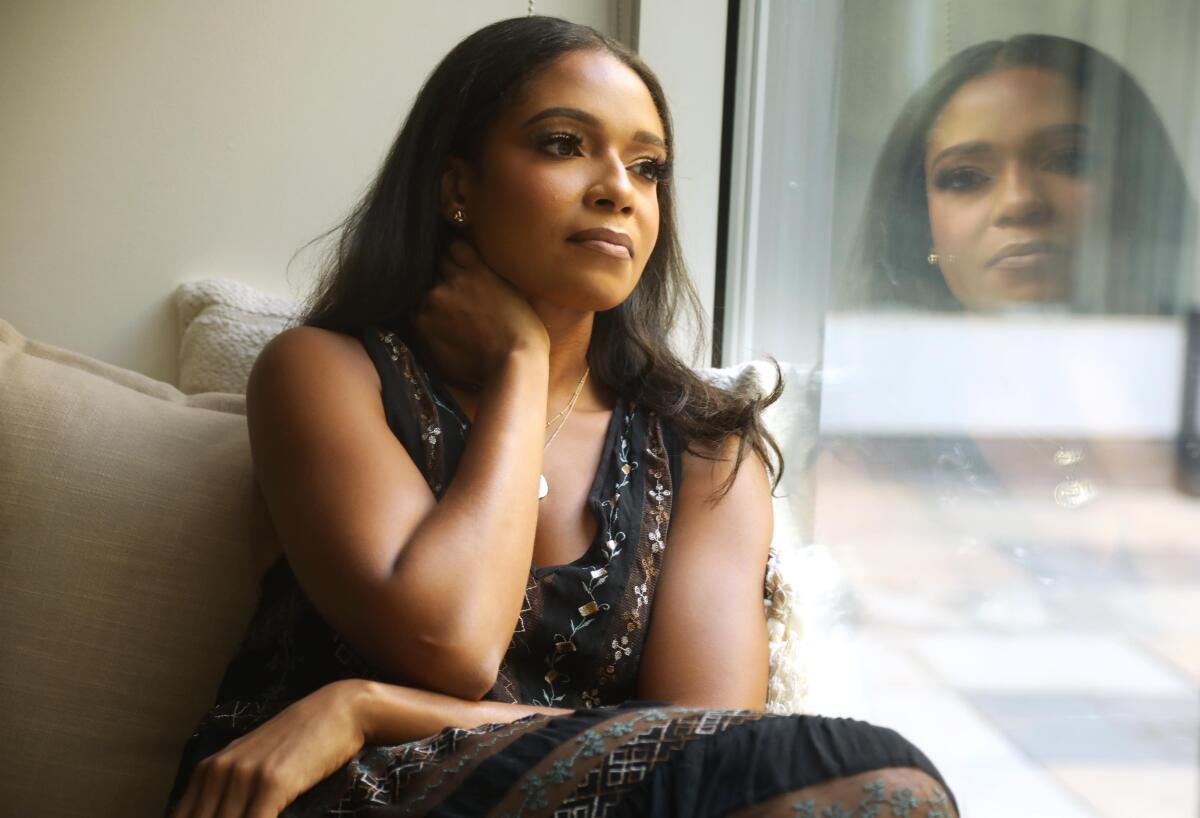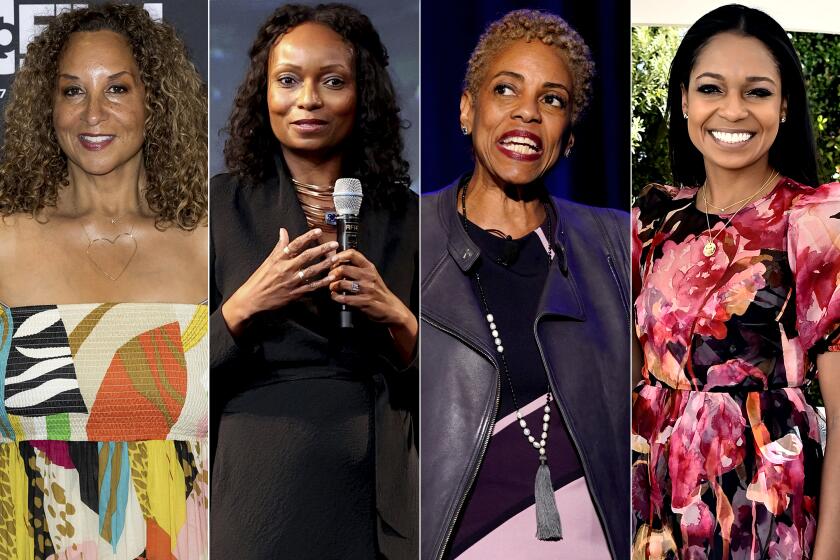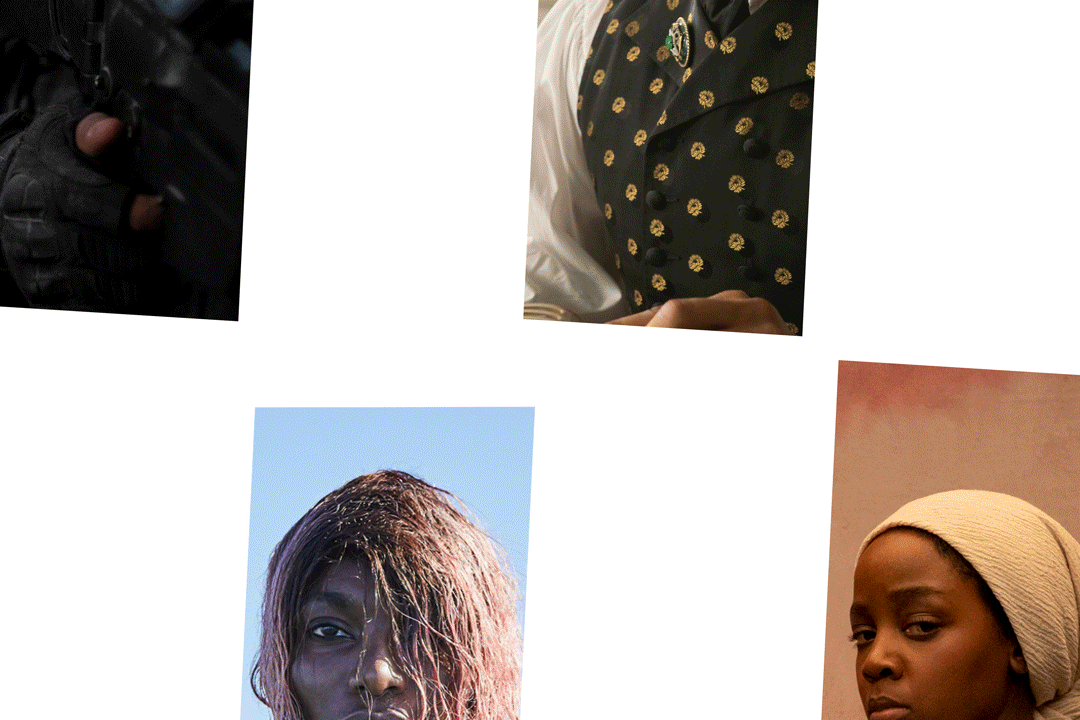Former Oscars diversity chief on ‘micro- and macro-aggressions’ that led to exit

Guest columnist Jeanell English explains why she left the film academy earlier this year — and why she’s not alone in the recent ‘exodus’ of Hollywood DEAI execs.
Like most women, I share an intimate relationship with my gynecologist. I went to see her during my last week working for the Academy of Motion Picture Arts and Sciences.
“When was your last period?” she asked. I hesitated before responding.
“Actually, my last period is the first one I had this year. It came just over a month ago, the week after I resigned from my job.”
She paused in reflection while glancing at my charts. When my feet were comfortably positioned in stirrups, she offered three words: “Rest is resistance,” taken from the title of the book by Tricia Hersey of the Nap Ministry. The phrase stuck with me.
Somewhere during my career journey, I forgot to rest. I can easily blame capitalism, and perfectionism. Both are plagues that disproportionately affect Black women (insert impressive “looks good on paper” list of accomplishments here). I thought that because my work was mission-driven, purpose-centered and urgent, there was no time for rest.
While this piece is in response to the recent exodus of Black women in diversity, equity, accessibility and inclusion (DEAI) roles in Hollywood, it is important to preface my commentary with this personal anecdote because my decision to leave my role was personal as much as circumstantial. Coincidentally, our departures made headlines following a disappointing Supreme Court decision on affirmative action that elevated a slew of concerns on the future of diversity commitments in entertainment.
Alongside conservative attacks on ‘woke’ entertainment, equity advocates call the departure of four key Hollywood diversity executives ‘frightening.’
I will be the first to acknowledge the importance of trends. They can provide a bird’s-eye view that directs attention to necessary topics. But I have concerns when a broad, sweeping narrative is applied to trends without thoughtful investigation of the details. While clinging to the headlines, we can miss important information, and essential calls to action that are critical to the movements looking to disrupt long-standing systems. This specific lens is needed when examining the state of the entertainment industry today.
I’d like to share with you the micro view of my what, my why and my observations on where we go from here, with the goal of prompting collective action to ensure a more diverse, inclusive and accessible entertainment industry.
Although my career began in the “diversity” space, that’s not where I intended it to go. In college, I majored in industrial and labor relations with a minor in visual studies. This is where I developed a deep affection for labor rights, a critical eye toward capitalism and a desire to work in the arts. I have dipped in and out of pure diversity roles; often, I was more influential when diversity was not a part of my job title. However, accepting my role at the academy to lead its representation, inclusion, accessibility and equity efforts in 2020 was intentional. It offered an opportunity to listen, to learn and to assess where the industry was in relation to this work, while informing my view of the path forward.
As I noted in my departure letter, I had a lot of wins during my time at the academy, including implementation of Representation and Inclusion Standards for Best Picture consideration. I prioritized systemic change, establishing policies and disrupting institutional legacy to facilitate a more equitable awards process and organization. I also contributed to a more inclusive approach to the academy’s work as a film archive and library; facilitated workshops to bring members and staff into new, uncomfortable dialogues; introduced an education-centered climate strategy; prioritized accessibility with an emphasis on the Oscars operations; and participated in the reform of long-standing Oscars campaign rules. The list goes on. I succeeded in large part due to incredible relationships I was able to establish without having true clarity on what authority I actually held. I established ambitious goals to keep me focused and demonstrate my value. I worked hard and moved fast to achieve them until I literally could no longer move.
My successes ultimately came at a cost — to my mental and physical health, my personal life, my joy. And what is life without joy?
In my role at the academy, I sat in the crossfire between the communities I was advocating for and those I was calling on to champion change. On both sides, there was fear. Fear made it challenging for those who are underrepresented within the industry to trust that I had their best interest at heart. Given the history of the industry, there was skepticism. They needed to know that I not only heard their concerns but felt them. There were also people in positions of power who feared change, feared losing relevance, feared losing money … and feared being canceled.
Fear created an impasse. It fueled a scarcity mind-set, as opposed to one of abundance. It prevented artists, executives, advocates and allies from being able to sincerely listen to understand without becoming defensive. And it provoked resistance to collaboration and creative thinking, a stance that has slowed or halted shifts not only at the academy but across the entire industry. Prioritizing DEAI is not the zero-sum game it is often perceived to be.
As a result, I became the recipient of a steady flux of micro- and macro-aggressions. I anticipated and grew accustomed to being regularly challenged, publicly and privately. I felt the pressure of remaining thoughtful, poised and articulate while coaching, counseling and responding to the needs of my colleagues also from marginalized communities and nursing my own wounds. The level of consensus-building needed to establish a foundation for the changes I encouraged demanded a level of mental agility and fortitude that was unsustainable. I, like many of my comrades in DEAI, acknowledge that feeling safe, valued and protected is fleeting in this work.
I never took my role at the academy to be the solution. I accepted my role to be a part of finding solutions. Yet there were times when “new” or “different” was perceived as a direct challenge to the legacy, history and excellence that the industry and the institutions that uphold it seek to preserve. I increasingly felt the weight of progress sitting more heavily on my shoulders along with less support and more demands, which would make it challenging to establish and meet a new set of goals in my role.
Specifically, when an organizational structure was introduced that eliminated my direct reporting line to the CEO, I felt as though my ability to effectuate institutional change was severely diluted. I was, however, still encouraged to be public-facing. I was concerned. Like many in this field, I fear performative DEAI positions. For me, these are positions where my Black skin and femininity are of more use to an organization as a form of public relations than my proven leadership and ability to facilitate systemic change.
After watching the work of incredible Black female artists whom I admire go unrecognized in the most recent Oscars, this moment hit me particularly hard. It was another reminder of how far our industry still has to go, particularly in terms of uplifting, advocating for and truly valuing the contributions of Black women. My exit from the academy was not an act of martyrdom. It was the only plausible decision after a liberating realization: “I will not sacrifice my life for the systems that do not see me.” Although I walked away exhausted, I left at peace feeling proud of what I accomplished, appreciative of the partners, allies and friends who enabled my successes and excited to invest my talents in different parts of the industry. I still do believe in solutions.
While DEAI leaders are now regularly lauded for their incredible tenacity, grit and talent, superficial endearments fall far short of our target: getting Hollywood to embrace the radical changes we are advocating for. We are beyond arguing the business case for diversity. It is essential that this critical moment of evolution for the industry include reimagined chief diversity roles, clear organizational values and the sustained financial investment required to accomplish equity and inclusion goals.
The murder of George Floyd spurred entertainment companies to make sweeping commitments to racial justice. A Times survey shows where things stand.
For institutions and organizations that have the benefit of DEAI leaders to help guide this shift, or for those looking to hire, I implore you to ask and answer some critical questions with actions:
- What purpose do these roles serve in your organization?
- To whom do these roles report?
- What authority are these leaders given to make decisions that directly impact the business?
- How are they and their teams being funded?
- Who is tasked with coming up with solutions?
- Who is responsible for implementing solutions?
- How is the accountability for achieving these solutions shared across leadership? How are you taking the weight of this work off the shoulders of a select few?
- How is success being measured?
- How are you ensuring that individuals in these positions are given the grace and gratitude to try, fail and try again? After all, doing this work is about progress, not perfection.
I am honored to be a part of an emerging generation of leaders in creative spaces who understand, and speak up for, the criticality of justice, equity, inclusion and accessibility to preserve our humanity and to capture the reality of the times we are in. A generation that values diversity to the extent that we are willing to stand up against censorship and respectfully embrace debate, even when the conversation is uncomfortable. A generation that refuses to accept the oppressive links between purpose, work and health.
I believe in art, including the art of filmmaking. It educates, provides perspective, shapes culture and has the power to enact broad societal changes. It is the most honest representation of a moment in time. In order to spark the renaissance we need, it is essential that we do not filter art, that we do not censor it, that we do not ban it — but rather that we invest in it, and uplift it, not only for some but for all.
I’m no longer simply advocating for change; I am committed to reimagining the entire industry.
I invite you to join me. Just remember to rest.
Jeanell English is the founder and CEO of Elizabeth, an impact agency focused on establishing and operationalizing equity-centered goals in entertainment and creative industries. Through its publishing arm and more traditional consulting services, Elizabeth aims to champion, advocate for and amplify the voices of women and other marginalized communities with art as a primary vehicle. Before establishing Elizabeth, English dedicated more than a decade to advancing DEAI initiatives within several organizations. She most recently served as executive vice president, impact and inclusion, for the Academy of Motion Picture Arts and Sciences, where she held responsibility for the organization’s internal and external DEAI work, talent development programs and climate action initiatives. Before joining the academy, English spent seven years working across Europe and Asia with Warner Bros. Discovery, where she held various corporate and production roles.
More to Read
Only good movies
Get the Indie Focus newsletter, Mark Olsen's weekly guide to the world of cinema.
You may occasionally receive promotional content from the Los Angeles Times.












